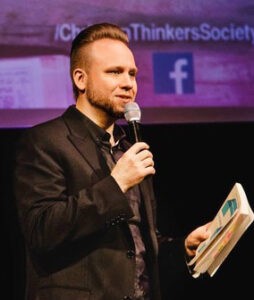A Texas megachurch has created a new staff position that, while perhaps the first of its kind for a Baptist church, could be a sign of things to come in the effort to foster a “biblical worldview.”
Prestonwood Baptist Church in the northern suburbs of Dallas this week named Jeremiah Johnston as associate pastor of apologetics and cultural engagement. He will serve in a dual role as dean of spiritual development at Prestonwood Christian Academy, the church’s massive network of private pre-K-12 schools.
Prestonwood Baptist Church is one of the largest churches in the Southern Baptist Convention and one of the largest Christian congregations in America. Its longtime pastor, Jack Graham, is a former SBC president.

Jeremiah Johnston
While a church like Prestonwood — with nearly 50,000 members spread across three campuses — has financial resources for innovative staff positions perhaps not available to more typical churches, the new staff position mirrors an emerging trend in other parts of evangelical Christian life.
Dallas Theological Seminary now has a director of cultural engagement, including a fellows program to train others in similar work. Liberty University offers an academic minor in apologetics and cultural engagement. Beeson Divinity School at Samford University offers a course in cultural apologetics.
In 2019, Paul Gould published a book titled Cultural Apologetics: Renewing the Christian Voice, Conscience, and Imagination in a Disenchanted World that sets the framework for this concept.
Gould, a philosophy professor at Palm Beach Atlantic University, defines cultural apologetics this way: “The work of establishing the Christian voice, conscience and imagination within a culture so that Christianity is seen as true and satisfying.”
That’s a kinder and gentler approach than the apologetics movement of the 1970s and 1980s, which often came across as defensive dogma. Modern cultural apologetics seeks to be more winsome than warrior.
The word “apologetics” is nothing new to Christianity. Some would argue the Apostle Paul and the disciples of Jesus were the first Christian apologists, making arguments to convince people of Christianity’s truths. Across Christendom, others have taken up this specific mantle either as part of an evangelistic mission or as an academic discipline.
Some would argue the Apostle Paul and the disciples of Jesus were the first Christian apologists, making arguments to convince people of Christianity’s truths.
The newer term “cultural apologetics” seeks to take the defense of Christian truth claims into the public square not as an academic exercise but as a way of speaking to — or sometimes against — modern culture. Thus, rather than debating the words of ancient philosophers, these modern apologists speak to films, popular music, literature, art, mass media and advertising.
That means in the context of America’s culture wars, cultural apologists brush up against many political issues, whether they intend to be political or not.
Gould also wrote a 2019 article for Christianity Today in which he explains the new interest in cultural apologetics. He links the needs for such work to the esteemed English theologian Lesslie Newbigin, who after serving 38 years as a missionary in India returned to England and, in Gould’s description, “found it had become a drastically different country from the one he left. It was becoming increasingly a post-Christian nation, one in need of a fresh missionary encounter.”
Soon after, Newbigin wrote his book Foolishness to the Greeks, in which he asks: “What would be involved in a missionary encounter between the gospel and this whole way of perceiving, thinking and living that we call ‘modern Western culture’?”
In the late 20th century and early 21st century, other notable people have taken up this question under various names. One of the best-known is Lee Strobel, a former Chicago Tribune investigative reporter who came to Christian faith as a young man and became a teaching pastor at Willow Creek Church in suburban Chicago, then later at Saddleback Church in Southern California. Strobel has written numerous books taking an investigative approach to biblical claims. The first in that series was the bestseller The Case for Christ.
Often, Christian cultural apologists today speak of a “Christian worldview” that they say is under threat by secularism and modernity.
Often, Christian cultural apologists today speak of a “Christian worldview” that they say is under threat by secularism and modernity. One of the chief purveyors of these warnings has been the pollster George Barna. Both through his own company, Barna Research, and his affiliation with the Cultural Research Center at Arizona Christian University, has for several decades reported on where Christians fail to understand basic truths of the faith.
Barna’s latest report, released last week by Arizona Christian University, warns of a spiritual crisis rampaging through Christian homes because parents are ill-equipped to teach their own children the essential beliefs of Christianity. The report warns of the dangers of “Christian nominalism” and “syncretism” and “heresy” that blends truth and deception.
However, defining exactly what constitutes the key or essential elements of a “biblical” worldview is challenging. Al Mohler, president of Southern Baptist Theological Seminary, preached a chapel sermon series that defined at least six essential beliefs: There is a God, the Bible is God’s word, Jesus is the Son of God, Jesus is the only way to heaven, heaven and hell are real, God is in charge of the universe.
Others turn to the ancient creeds of the church for guidance on essential beliefs.
Johnston, named to the new role at Prestonwood, also founded an organization called the Christian Thinkers Society. That group’s mission is “to teach Christians to become thinkers and thinkers to become Christians.” The website explains this as helping pastors and believers “equip, train and educate Christians to respond in an informed and defensible manner regarding the core truths that are at the heart of the Christian faith” and “to reach a new demographic and demonstrate why Christianity makes sense, is enriching to life and why it is essential for the betterment of society.”
“We’re wanting to evidence our faith and grow in our faith to such an extent that we can answer the difficult questions.”
In an interview with Baptist Press, Johnston said: “I am thrilled that the Lord has called me to Prestonwood because we want to recover the historic legacy of a thinking church. When we look at the historic faith, apologetics was just as — if not more — importantly used to commend the faith to believers in the church as it was to defend the faith to those outside the church. We’re not just trying to be the smartest people in the room; that’s exactly what we’re not trying to do. We’re wanting to evidence our faith and grow in our faith to such an extent that we can answer the difficult questions.”
Johnston said he wants to help local congregations become centers of cultural apologetics and not limit such work to academic institutions. “We have to bring this content to worship services and Sunday schools, and not just conferences. We have to put it into the very DNA of our programs,” he said.
“With how the culture is going today, I can’t imagine a local church not having an apologetics emphasis every week,” Johnston added. “The church is only as strong as the people in it. We can’t have a few ‘special forces’ Christian apologists in the local church because we need every one of us. When we’re at the coffee shops, restaurants or school meetings, we all remember times when we should have spoken up but we were silent. The greatest asset of the churches is our members and that’s why we want to architect a program that emphasizes Christian thinking at every age level.”
Related articles:
Who needs the church when we have the biblical worldview? | Analysis by Jacob Alan Cook
Why your worldview might be both more and less than biblical | Analysis by Jacob Alan Cook


